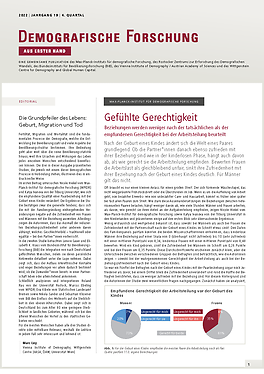December 19, 2022 | Defo News
What personal networks do refugees have?

© MPIDR
The new issue (No. 4/2022) of Demografische Forschung Aus Erster Hand, the popular science newsletter with latest research results from demography, has been released.
The Newsletter is available in German only.
"Demografische Forschung Aus Erster Hand" is a joint publication of the Max Planck Institute for demographic Research (MPIDR), the Rostocker Zentrum zur Erforschung des Demografischen Wandels (RZ), the Vienna Institute of Demography (VID), the Wittgenstein Centre for Demography and Global Human Capital and the Federal Institute for Population Research (BiB).
The topics of the new issue are:
1. Perceived fairness
Relationships are evaluated by perceived rather than actual fairness in the division of labor
(Max Planck Institute for Demographic Research)
The world of a couple changes fundamentally after childbirth. Whether the partners are as satisfied with their relationship then as they were during their childless phase hinges in part on how fair they perceive the division of labor to be. If women consider the work load as stable unfair, their relationship satisfaction drops markedly after the birth of a child. This does not apply to men, however.
2. What personal networks do refugees have?
Singles have more extrafamilial and interethnic contacts than couples or families with children
(Federal Institute for Population Research)
In 2020, almost 1.5 million refugees lived in Germany. This makes Germany one of the world's most important targets for refugee- and crisis migration. A new study by the Federal Institute for Population Research now investigates the extent to which families shape the personal networks of refugees and how often refugees establish close contacts with people from the target country or other cultures.
3. Where can people age in good health?
Younger senior citizens live longer in the countryside, advanced senior citizens do so in cities
(Rostock Center for the Study of Demographic Change)
Studies have yielded very disparate results on whether older people live healthier in the city or in the countryside. A new study now shows that if certain distorting factors are factored out, a fairly clear picture emerges, at least for Germany, England, and Wales.
The newsletter is released four times a year and is available electronically and as a printed version and is free of charge.
All past issues are available online on the Newsletter website. On the website you also have the possibility to subscribe to the Newsletter to get informed about the release of the new issues or to receive the printed versions by mail.